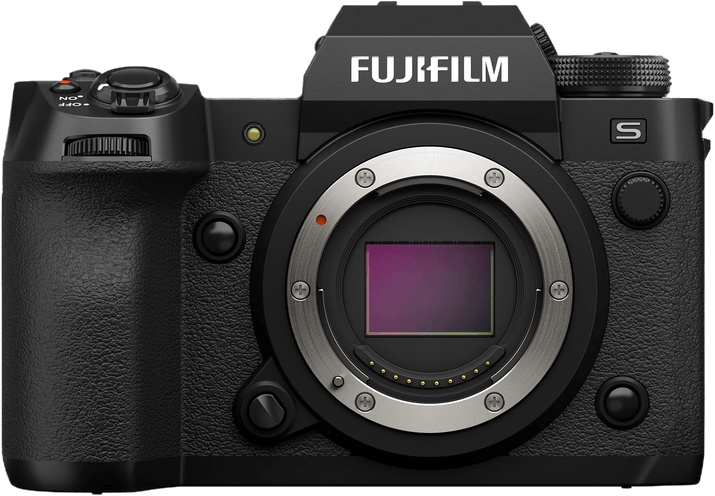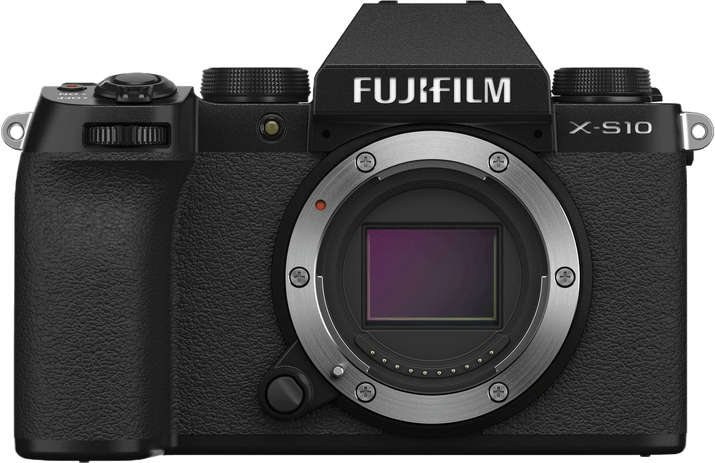Fujifilm X-H2S vs X-S10 Comparison
Fujifilm X-H2S

Fujifilm X-S10

The Fujifilm X-H2S outshines the Fujifilm X-S10 with a score of 79/100 compared to 69/100. Both cameras are mirrorless and were released in 2022 and 2020, respectively. They share similar specifications, but the X-H2S takes the lead with its larger size (136 x 93 x 95mm) and heavier weight (660g / 1.46lbs), which may provide better stability and durability.
However, the X-S10 has its advantages, such as a more affordable launch price of $999 compared to the X-H2S’s $2500. Additionally, the X-S10 is lighter (465g / 1.03lbs) and more compact (126 x 85 x 65mm), making it easier to carry and handle.
Taking these factors into consideration, the Fujifilm X-H2S is indeed a superior camera, while the Fujifilm X-S10 offers a more budget-friendly and portable option for photographers.
Fujifilm X-H2S vs X-S10 Overview and Optics
The Fujifilm X-H2S outperforms the Fujifilm X-S10 in optics, with a score of 77/100 compared to the X-S10’s 72/100. Both cameras share several specifications, including 26-megapixel resolution, CMOS sensor type, APS-C sensor size, Fujifilm X lens mount, and image stabilization.
The X-H2S’s superior performance is mainly due to its faster shooting speed and more advanced processor. With a shooting speed of 40 frames per second (fps), the X-H2S is twice as fast as the X-S10, which has a shooting speed of 20 fps. This difference allows the X-H2S to capture fast-moving subjects more effectively. Additionally, the X-H2S is equipped with the X-Processor 5, an upgrade from the X-S10’s X-Processor 4. The improved processor contributes to faster processing, better image quality, and enhanced performance in low light conditions.
While the X-S10 falls short in shooting speed and processing power, it still offers excellent performance for its price point. With the same resolution, sensor type, and image stabilization as the X-H2S, the X-S10 can produce high-quality images suitable for most photography enthusiasts. The lower score does not imply that the X-S10 is a poor-quality camera, but rather that the X-H2S offers superior performance in certain aspects.
When considering which camera to purchase, potential buyers should weigh the importance of shooting speed and processing power against their specific needs and budget. The Fujifilm X-H2S is the clear winner in terms of optics performance, but the Fujifilm X-S10 remains a strong contender for those seeking a more affordable option without compromising on image quality.
Fujifilm X-H2S vs X-S10 Video Performance
The Fujifilm X-S10 outperforms the Fujifilm X-H2S in video capabilities, with a score of 91/100 compared to the X-H2S’s score of 83/100. Both cameras share some common specifications, including 4K max video resolution and 4096 x 2160 max video dimensions. Additionally, both cameras also have built-in time-lapse functionality.
The X-S10 surpasses the X-H2S in video performance primarily due to its higher max video frame rate of 240fps, significantly greater than the X-H2S’s 60fps. This higher frame rate allows for smoother slow-motion video capture and improved overall video quality, making the X-S10 a more versatile option for videographers.
While the X-H2S has a lower video score, it still offers decent video capabilities with its 4K resolution, 4096 x 2160 max video dimensions, and 60fps max video frame rate. These features make it a suitable choice for casual videography or for those who do not require the advanced frame rate offered by the X-S10.
Comparing the video capabilities of the two cameras, the Fujifilm X-S10 is the clear winner due to its higher video score and superior max video frame rate. This makes it the preferred choice for videographers seeking advanced video performance. On the other hand, the Fujifilm X-H2S remains a viable option for those looking for a camera with solid video capabilities but not requiring the higher frame rate provided by the X-S10.
Fujifilm X-H2S vs X-S10 Features and Benefits
The Fujifilm X-H2S emerges as the winner in this comparison with a feature score of 85/100, while the Fujifilm X-S10 trails behind at 70/100. Both cameras share several specifications, including a 3-inch screen size, touchscreen capabilities, flip screens, lack of GPS, and Bluetooth connectivity. However, the X-H2S outshines the X-S10 in some aspects, making it the superior choice.
One key advantage of the X-H2S is its higher screen resolution of 1,620,000 dots, compared to the X-S10’s 1,040,000 dots. This difference results in a sharper and clearer display on the X-H2S, which enhances the user’s experience while framing shots and reviewing images. Moreover, the X-H2S offers Wi-Fi connectivity, enabling quick and seamless transfer of images to other devices and remote control of the camera. Unfortunately, the X-S10 lacks this feature, making it less convenient for users who value wireless connectivity.
Although the X-S10 falls short in screen resolution and Wi-Fi, it shares many essential features with the X-H2S, such as touchscreen, flip screen, and Bluetooth. These similarities make it a viable option for users who prioritize these functionalities and are willing to compromise on screen resolution and Wi-Fi connectivity.
In this comparison, the Fujifilm X-H2S stands out as the better camera due to its higher feature score, superior screen resolution, and Wi-Fi capabilities. The Fujifilm X-S10, while not as feature-rich, remains a decent option for those who prioritize shared specs and are willing to overlook its shortcomings.
Fujifilm X-H2S vs X-S10 Storage and Battery
The Fujifilm X-H2S outperforms the Fujifilm X-S10 in storage and battery, with a score of 76/100 compared to the X-S10’s 35/100. Both cameras share the convenience of USB charging, but the X-H2S excels in other aspects.
The X-H2S has two memory card slots, accepting CFexpress Type B and SD (UHS-II compatible) cards, providing more storage and flexibility. Its battery life is also superior, with the NP-W235 offering 580 shots per charge. In contrast, the X-S10 has only one memory card slot, accepting SD/SDHC/SDXC (UHS-I compatible) cards, and its NP-126S battery provides 325 shots per charge.
While the X-S10 falls short in storage and battery life, it still offers USB charging and compatibility with widely available SD cards. However, the X-H2S clearly stands out as the better choice in this category, with double the memory card slots and a significantly longer battery life. This makes the Fujifilm X-H2S a more reliable and versatile option for photographers who prioritize storage capacity and battery performance.
Fujifilm X-H2S vs X-S10 – Our Verdict
Are you still undecided about which camera is right for you? Have a look at these popular comparisons that feature the Fujifilm X-H2S or the Fujifilm X-S10:
